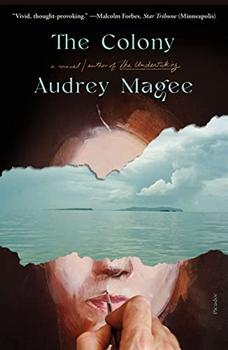Page 1 of 1
There are currently 4 reader reviews for The Colony
Write your own review!
Laura Hansen
Read it!
As a poet, I was drawn to the unique style. As an avid reader, I fell in love with the brightly drawn characters. As a book group discussion leader, I reveled in the themes and layers of this highly praised novel. Folks, I read it in one sitting, completely absorbed by the setting.
 Anthony Conty
A Slice of Irish History
Anthony Conty
A Slice of Irish History
"The Colony" by Audrey Magee tells the story of a small island off the coast of Ireland. It reads like a poem with short, choppy one-line sentences, proving that those in the UK are likelier to honor a book with a unique narrative structure. I enjoyed it, mainly as the bond between visiting artist Mr. Lloyd and native islander James develops, but it adds up to a much quicker read than its 376 pages suggest. Magee's style is hers and hers alone.
Mr. Lloyd and Jean-Pierre Masson both visit the island with very different goals. One wanted a quiet place to draw, and another was to study the language and keep it alive. Of course, the two men share a tiny space. The linguist's desire to keep the language alive and the artist's desire for a vacation spot that has evolved slightly find themselves immediately at odds. The love of tradition and the willingness to change will also barely conflict with each other.
The three conflicted souls, James (given name Seamus, as Jean-Pierre insists on calling him), Jean-Pierre, and Mr. Lloyd, focus on the part of their lives that they hold dear. Protecting their art, language, and future are their singular goals. Due to the story's timing, the author regularly takes to non-connected stories about men killed in the IRA conflict. The islanders live disconnected from these troubles, but the incidents show how the language and culture are also dying.
The family on the island repeatedly says that they do not discuss politics on the island when the murders come up. Religion as the basis for the violence makes the conversation even more difficult. It makes the bickering about the language seem trivial. For that reason, I was a little anxious for the stories of the murders and our guests to mesh together since the arguing about the language became repetitive after a while. I felt we were supposed to agree with the linguist, but he came off as petulant.
That is not to say that isn't a lot of good stuff here. You could learn a lot about the significance of art, family, and tradition. I enjoyed the artist's apprentice theme and visual imagery. The author even had a way of building suspense over a large canvas. “The Colony” will be the quickest 370-page read of your life.
elisa kristensen
Not impressed
The book is very hard to digest, unable to keep me engaged, far too many details about a world that i did not care for.
Gary
No punctuation!
Punctuation has evolved over time as a means of transferring a story from the writer to the reader without the reader having to attend to the medium.
If I have to work out where dialogue starts and ends I'm spending more time concentrating on the typed words than their contents. More time on the author's idiosyncrasies than the story.
I'm not interested in the former, I want to enjoy the latter.
Punctuate it and I might read it.
